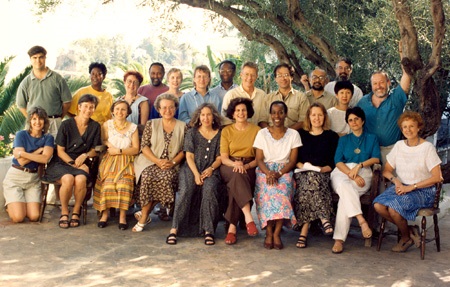Transnationalism, Nation-State Building, and Culture
Date
Jun 14-22, 1994Organized by
Linda Basch, Nina Glick Schiller and Cristina Szanton BlancLocation
Hotel Mijas, Mijas, SpainParticipants
- Linda Basch Wagner College, USA
- Donald Carter State University of New York Institute of Technology, USA
- Carolle Charles City University of New York, Baruch College, USA
- Partha Chatterjee Center for Studies in Social Science, India
- Virginia Dominguez University of Iowa, USA
- Bela Feldman-Bianco Universidade Estadual de Campinas, Brazil
- Carlos Gimenez Universidad Autónoma de Madrid, Spain
- Nina Glick Schiller University of New Hampshire, USA
- Catherine Hall University of Essex, UK
- Stuart Hall The Open University, UK
- Pauline Herrmann City University of New York, Graduate Center, USA
- Michael Kearney University of California, Riverside, USA
- Daniel Mato Universidad Central de Venezuela
- Aihwa Ong University of California, Berkeley, USA
- Rinus Penninx University of Amsterdam, The Netherlands
- Saskia Sassen Columbia University, USA
- Sydel Silverman Wenner-Gren Foundation, USA
- Constance Sutton New York University, USA
- Cristina Szanton Blanc Columbia University, USA
- Catherine Wihtol De Wenden Centre National de la Recherche Scientifique, France
- Rosina Wiltshire International Development Research Center, Canada
ORGANIZER’S STATEMENT: Twenty-two scholars from the United States, Europe, Latin America, and Asia were brought together to explore what conference organizers saw as a central paradox: Since increasing numbers of people live their lives across borders and capital accumulation is becoming more global, why are large nation-states closing their borders, “postcolonial” states trying to incorporate past citizens, and smaller territorial units constituting themselves as nation-states? Unfolding the nature of this paradox engaged participants in linking constructions of national identity, ethnicity, race, and gender to the current restructuring of capitalism. Conference participants also worked to bring theoretical clarity to the concept of “transnationalism,” a term increasingly yet variously used in the social sciences. Papers presented focused attention on the manner in which transnational migration affected debates about culture, citizenship, and constructions of race, ethnicity, and national identity. Using the comparative material on transnational processes, conferees worked collectively to examine cultural production, representation, and the symbolic contestation of power. After the conference, organizers developed a session for the 1994 AAA meetings to further the discussion begun in Mijas.
Wenner-Gren Symposium #117
